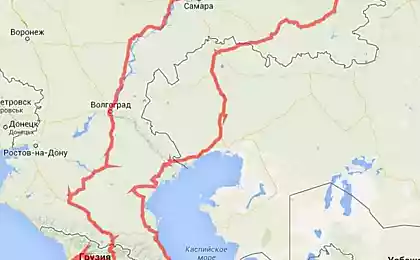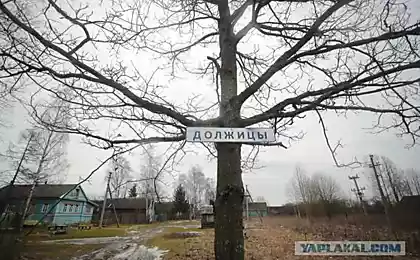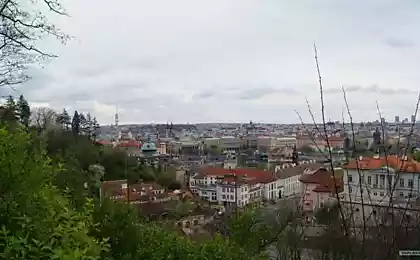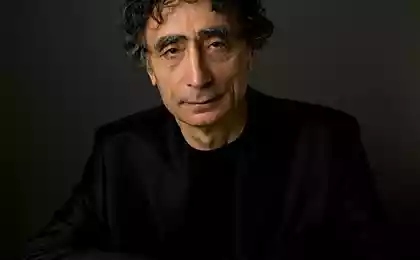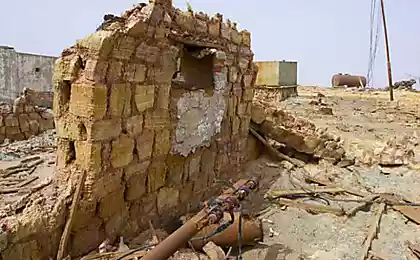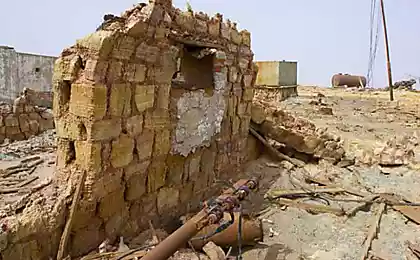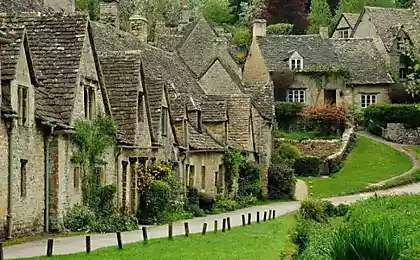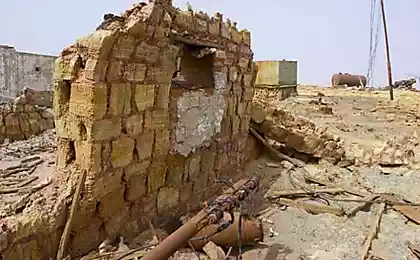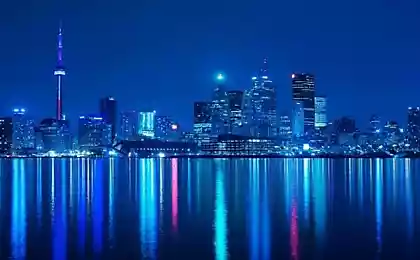550
New redneck. Why escape from the city wants but can not?
Imagine in your big, beautiful, beloved city came some very smart people, and with their arrival life was slowly but irreversibly turn into a bad dream. First, they took what for and shut down all the museums, theatres, libraries and even concert halls. Then they took away all the ordinary people their business, rounded up in one large manufacturing company just said: "here to work".
Then these strange people are a little more thought, gathered ordinary people and said: "okay. We're built for you a large air of the commune, they are floating in the air on giant airships, it's got everything you need for life. It is much more convenient and promising than living in a stupid, backward land cities. In the air more than on the plane, fit people. There is less gravity, it is good for health. There will always be pure because of the trash we just dump down. There will be eternal summer and eternal day, because the air has no boundaries, you can move to follow the sun. Over there we will not let other people, we can not be afraid, they cannot reach us. In short, the future of mankind would have pronounced the air in nature, and then soon only one will remain."
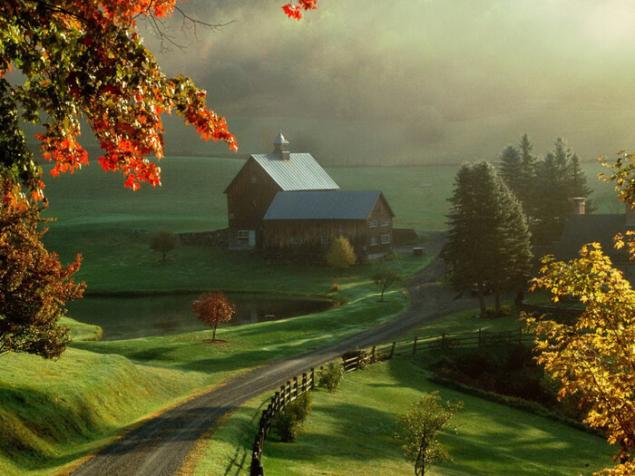
Some ordinary people out of stubbornness still left to live at the bottom, but in the once prosperous land cities life quickly began to deteriorate: the roads were cracked, the power is out, a lot of crime. The first generation still somehow survived, but their children and grandchildren themselves began to aspire to the top. Very soon on the earth there are only old people, alcoholics and rare heroic person.
Nonsense? Maybe nonsense. But looks like a brief summary of the XX century. Not only for urban residents, and for residents of a Russian village. Throughout this time their familiar world, their cosy universe painfully destroyed, cut in parts, like the tail of the dog. Came some strange people with revolvers and machine guns, behaved like rabid Martians, roughly raped the natural course of things, complicate the simple and simplify the complex. Closed churches, took the cattle, drove all huge and awkward farms. Then they started to enlarge the village, tore the people from the land and put in the towns, and who does not fit — went to the city and enriched the Russian language a new word "limit". A minority still remained on earth, got used to the awkward collective, but here's the weird smart people and shut them down. Now optimize, schools, hospitals, and in fact are the second strengthening to the fact that since Khrushchev's consolidation had to grind.
I still remember the five-storey courtyards in which there were men with accordions, each bench was a bench, the potatoes are dried in the Playground, and if the two aunts will have a fight, shouting for the whole neighborhood. Village life was painfully trying to get into the skin of the city. Somehow it happened, but at the cost of extreme pain, which even the film "Afonya" to describe not. This psychological trauma sits within us all.Actually I am an optimist, trying to cling to any opportunity to continue, but then, frankly, cling not for that. When the professional pessimists say: "the Village is dead", they are wrong only in the formula died with the village, died of traditional rural life. But the people on earth to live no longer. They even will be more. Only it will have slightly different people.
Why we have lived for centuries on the earth? Because it was the main means of production and the sole employer. Our ancestors grew wheat, potatoes, flax, raised on pasture cattle, cut down in the forest firewood, fished in the rivers the fish — all this gave them the land. The surplus we sold at the fair to give to the Treasury the tax and buy some products yet primitive crafts. But then the economy became more complex, complicated and colonels to the fact that there were tractors, combines, trucks, mine-sweepers — all these things began to take jobs from the peasants. With all due disrespect to the Martians, the process of urbanization of the country was inevitable. In one form or another throughout the twentieth century it was happening all over the planet, and the tragedy of the Russian peasantry, as compared, for example, with the tragedy of the peasantry in the Brazilian or Mexican — not the worst option.
Further more. There are harvesters that can handle thousands of hectares a day without human intervention. They walk themselves, have GPS and we are needed only in case of breakage. With such a rabid performance of this technique do not need permanent residence: she wanders around the country by appointment and caters to small and medium farmers. Large farms that own this technique gradually assumed control of small and medium-sized. As a result, the whole country and we will soon have a few hundred giant firms, which need many thousands of people, but not millions. From the former peasantry will remain on the ground only highly qualified professionals, state employees, retirees and algologic. Although there: alcoholics something just urban, selfless and voluntary victims of black realtors.
But the damn economy as it develops further. And almost ripens into what is now the cities become a form of life, is not very relevant to the new economic reality. Cities have become too expensive, this affects the cost of labor. Cities have become a constant source of problems — social, ethnic, environmental. Service cities with their increasingly complex infrastructure is becoming more costly. As a result, today we are witnessing the beginning of a process that will likely take the entire XXI century is a crisis of urbanization and the formation of new formation of people, which I would call "post-industrial peasantry."
What, in fact, different grandfather, who planted a turnip and then pulled her with the grandmother, daughters, bugs and mice from the same computer designer who sits at his computer and using the same mouse on the screen generates the layout of the product for a 3D printer? Yes, nothing. It is proletarian to create an UAZ "Patriot", you need a built exploiter of the pipeline and a couple of hundreds of proletarians in the same pipeline. And Dedkov, grandmother and a computer designer, there are no intermediaries between their work and the product. And then the question arises: and guys do this man to be in the city to breathe the fumes and to pay the rent 30 thousand rubles a month?
The most advanced and conscious representatives of the nascent post-industrial peasantry, in fact, has long been in the cities, not stick out.
The experience of my Cycling travels in Europe says that in the same Germany or Ireland for each villager, which picks in the ground, we have a few rural residents who are poking around in the keyboard program, traded on the stock exchange, write texts, take pictures in your own Studio advertising — a list of occupations that are not linked to the metropolis, is expanding every year.I must say that in a tight Europe the process of asurbanipal requires almost no now from the state special attachments: there are good roads, fast trains, even those who every day have to work, often live in 100 km from your business. So the children and grandchildren of these people now do not have anywhere to migrate. They rarely just sit on the car or high speed train to arrive to their workplace. They just stay at home. Their workplace is here now.
We have post-industrial peasants too short, and they have long flocked to the countryside. Kooks programmers, punters, and even demand, in the Humanities, there is now enough. There are even whole colonies, inhabited by profession fit their names to the villages to change: were Blacksmiths, were the Introverts. And it's not downshifting, these people fled the city, not in order to bamboo to smoke or play in a rustic pastoral dream.
I do not believe that these glamorous farmers, reforged from sales managers. Working the land is hard work, which gets old quickly if you're not born.But post — industrial peasants-they differs from the downshifters that he came to earth to live and work. Exactly the same as the ordinary peasants. Just another specialization, so they need the land not under cultivation, and under the lawn.
But, unfortunately, the government in this process has not kept pace. We still have few good roads, high speed trains, we have a low level of gasification and completely ruined the rural social sphere. Even if you live 300 miles from the metropolis, to drive once a week for a business meeting or meeting classmates — this thing the whole day or even two. What to do with the children? Well, no kindergarten, if you live on earth you can do. But without a good school?
Therefore, our first generation of post-industrial peasants — either people alone, or young and still childless families, or groups of like-minded people who combine conventional bourgeois life with some ideological project. Or... Yeah, unfortunately, many of these people at all go to peasant abroad. If your country is not the best way offers, why not draw your turnip in any foreign province by the sea?
Saving on development of rural infrastructure, we lose not only people, but also, oddly enough, money. After all, the man city today costs much more than a village. The arrangement of the modern cities in accordance with the needs of the XXI century — is a bottomless expense Sisyphean task.
Here is just one example. State expenditures on construction of the Fourth transport ring in Moscow — with the land acquisition, demolition, relocation of utilities and other horror — this figure is of the same order as that government investment in high-speed railway line Moscow — Kazan. That will give CTK Moscow? So, small transport respite. And the road Moscow — Kazan is a powerful impetus for the resettlement of people in the countryside. Why not live and work somewhere near Gorokhovets, if there Kursky station is one and a half to two hours comfortable drive? Why would a wealthy post-industrial peasant not to go somewhere for Sochi? Because it is convenient! Two hours before one of the capital, two hours before the other. There are now even "Peregrine" go, and soon more and speed you put the asphalt.
In the space between St. Petersburg and Moscow, you can create a huge rural metropolis for those who are willing to live and work in the capital business, but to live in the village. What is stopping you? So Yes, a little. Scorched over the past 20 years of rural schooling, medicine and cultural life. Nowhere to learn, nowhere to be treated, and signs of civilization for many tens of kilometers — only elite hunting, yacht clubs and for their country palaces languishing city of the Martians. published
Author: Dmitry Sokolov-Mitrich
P. S. And remember, only by changing their consumption — together we change the world! ©
Join us in Facebook , Vkontakte, Odnoklassniki
Source: foma.ru/novaya-derevenshhina-ili-pochemu-sbezhat-iz-goroda-hochetsya-no-ne-mozhetsya.html
Then these strange people are a little more thought, gathered ordinary people and said: "okay. We're built for you a large air of the commune, they are floating in the air on giant airships, it's got everything you need for life. It is much more convenient and promising than living in a stupid, backward land cities. In the air more than on the plane, fit people. There is less gravity, it is good for health. There will always be pure because of the trash we just dump down. There will be eternal summer and eternal day, because the air has no boundaries, you can move to follow the sun. Over there we will not let other people, we can not be afraid, they cannot reach us. In short, the future of mankind would have pronounced the air in nature, and then soon only one will remain."

Some ordinary people out of stubbornness still left to live at the bottom, but in the once prosperous land cities life quickly began to deteriorate: the roads were cracked, the power is out, a lot of crime. The first generation still somehow survived, but their children and grandchildren themselves began to aspire to the top. Very soon on the earth there are only old people, alcoholics and rare heroic person.
Nonsense? Maybe nonsense. But looks like a brief summary of the XX century. Not only for urban residents, and for residents of a Russian village. Throughout this time their familiar world, their cosy universe painfully destroyed, cut in parts, like the tail of the dog. Came some strange people with revolvers and machine guns, behaved like rabid Martians, roughly raped the natural course of things, complicate the simple and simplify the complex. Closed churches, took the cattle, drove all huge and awkward farms. Then they started to enlarge the village, tore the people from the land and put in the towns, and who does not fit — went to the city and enriched the Russian language a new word "limit". A minority still remained on earth, got used to the awkward collective, but here's the weird smart people and shut them down. Now optimize, schools, hospitals, and in fact are the second strengthening to the fact that since Khrushchev's consolidation had to grind.
I still remember the five-storey courtyards in which there were men with accordions, each bench was a bench, the potatoes are dried in the Playground, and if the two aunts will have a fight, shouting for the whole neighborhood. Village life was painfully trying to get into the skin of the city. Somehow it happened, but at the cost of extreme pain, which even the film "Afonya" to describe not. This psychological trauma sits within us all.Actually I am an optimist, trying to cling to any opportunity to continue, but then, frankly, cling not for that. When the professional pessimists say: "the Village is dead", they are wrong only in the formula died with the village, died of traditional rural life. But the people on earth to live no longer. They even will be more. Only it will have slightly different people.
Why we have lived for centuries on the earth? Because it was the main means of production and the sole employer. Our ancestors grew wheat, potatoes, flax, raised on pasture cattle, cut down in the forest firewood, fished in the rivers the fish — all this gave them the land. The surplus we sold at the fair to give to the Treasury the tax and buy some products yet primitive crafts. But then the economy became more complex, complicated and colonels to the fact that there were tractors, combines, trucks, mine-sweepers — all these things began to take jobs from the peasants. With all due disrespect to the Martians, the process of urbanization of the country was inevitable. In one form or another throughout the twentieth century it was happening all over the planet, and the tragedy of the Russian peasantry, as compared, for example, with the tragedy of the peasantry in the Brazilian or Mexican — not the worst option.
Further more. There are harvesters that can handle thousands of hectares a day without human intervention. They walk themselves, have GPS and we are needed only in case of breakage. With such a rabid performance of this technique do not need permanent residence: she wanders around the country by appointment and caters to small and medium farmers. Large farms that own this technique gradually assumed control of small and medium-sized. As a result, the whole country and we will soon have a few hundred giant firms, which need many thousands of people, but not millions. From the former peasantry will remain on the ground only highly qualified professionals, state employees, retirees and algologic. Although there: alcoholics something just urban, selfless and voluntary victims of black realtors.
But the damn economy as it develops further. And almost ripens into what is now the cities become a form of life, is not very relevant to the new economic reality. Cities have become too expensive, this affects the cost of labor. Cities have become a constant source of problems — social, ethnic, environmental. Service cities with their increasingly complex infrastructure is becoming more costly. As a result, today we are witnessing the beginning of a process that will likely take the entire XXI century is a crisis of urbanization and the formation of new formation of people, which I would call "post-industrial peasantry."
What, in fact, different grandfather, who planted a turnip and then pulled her with the grandmother, daughters, bugs and mice from the same computer designer who sits at his computer and using the same mouse on the screen generates the layout of the product for a 3D printer? Yes, nothing. It is proletarian to create an UAZ "Patriot", you need a built exploiter of the pipeline and a couple of hundreds of proletarians in the same pipeline. And Dedkov, grandmother and a computer designer, there are no intermediaries between their work and the product. And then the question arises: and guys do this man to be in the city to breathe the fumes and to pay the rent 30 thousand rubles a month?
The most advanced and conscious representatives of the nascent post-industrial peasantry, in fact, has long been in the cities, not stick out.
The experience of my Cycling travels in Europe says that in the same Germany or Ireland for each villager, which picks in the ground, we have a few rural residents who are poking around in the keyboard program, traded on the stock exchange, write texts, take pictures in your own Studio advertising — a list of occupations that are not linked to the metropolis, is expanding every year.I must say that in a tight Europe the process of asurbanipal requires almost no now from the state special attachments: there are good roads, fast trains, even those who every day have to work, often live in 100 km from your business. So the children and grandchildren of these people now do not have anywhere to migrate. They rarely just sit on the car or high speed train to arrive to their workplace. They just stay at home. Their workplace is here now.
We have post-industrial peasants too short, and they have long flocked to the countryside. Kooks programmers, punters, and even demand, in the Humanities, there is now enough. There are even whole colonies, inhabited by profession fit their names to the villages to change: were Blacksmiths, were the Introverts. And it's not downshifting, these people fled the city, not in order to bamboo to smoke or play in a rustic pastoral dream.
I do not believe that these glamorous farmers, reforged from sales managers. Working the land is hard work, which gets old quickly if you're not born.But post — industrial peasants-they differs from the downshifters that he came to earth to live and work. Exactly the same as the ordinary peasants. Just another specialization, so they need the land not under cultivation, and under the lawn.
But, unfortunately, the government in this process has not kept pace. We still have few good roads, high speed trains, we have a low level of gasification and completely ruined the rural social sphere. Even if you live 300 miles from the metropolis, to drive once a week for a business meeting or meeting classmates — this thing the whole day or even two. What to do with the children? Well, no kindergarten, if you live on earth you can do. But without a good school?
Therefore, our first generation of post-industrial peasants — either people alone, or young and still childless families, or groups of like-minded people who combine conventional bourgeois life with some ideological project. Or... Yeah, unfortunately, many of these people at all go to peasant abroad. If your country is not the best way offers, why not draw your turnip in any foreign province by the sea?
Saving on development of rural infrastructure, we lose not only people, but also, oddly enough, money. After all, the man city today costs much more than a village. The arrangement of the modern cities in accordance with the needs of the XXI century — is a bottomless expense Sisyphean task.
Here is just one example. State expenditures on construction of the Fourth transport ring in Moscow — with the land acquisition, demolition, relocation of utilities and other horror — this figure is of the same order as that government investment in high-speed railway line Moscow — Kazan. That will give CTK Moscow? So, small transport respite. And the road Moscow — Kazan is a powerful impetus for the resettlement of people in the countryside. Why not live and work somewhere near Gorokhovets, if there Kursky station is one and a half to two hours comfortable drive? Why would a wealthy post-industrial peasant not to go somewhere for Sochi? Because it is convenient! Two hours before one of the capital, two hours before the other. There are now even "Peregrine" go, and soon more and speed you put the asphalt.
In the space between St. Petersburg and Moscow, you can create a huge rural metropolis for those who are willing to live and work in the capital business, but to live in the village. What is stopping you? So Yes, a little. Scorched over the past 20 years of rural schooling, medicine and cultural life. Nowhere to learn, nowhere to be treated, and signs of civilization for many tens of kilometers — only elite hunting, yacht clubs and for their country palaces languishing city of the Martians. published
Author: Dmitry Sokolov-Mitrich
P. S. And remember, only by changing their consumption — together we change the world! ©
Join us in Facebook , Vkontakte, Odnoklassniki
Source: foma.ru/novaya-derevenshhina-ili-pochemu-sbezhat-iz-goroda-hochetsya-no-ne-mozhetsya.html
A dog from the shelter could not contain his emotions when he realized that they came to take him away, not put him to sleep.
17 hotel life hacks





